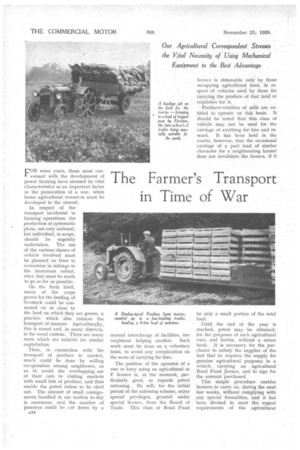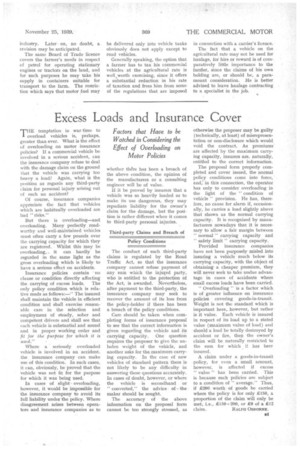The Farmer's Transport in Time of War
Page 26

Page 27

If you've noticed an error in this article please click here to report it so we can fix it.
L'OR some years, those most con versant with the development of power farming have stressed its vital characteristics as an important factor in the prosecution of a war, when home agricultural resources must be developed to the utmost.
In respect of the transport incidental to farming operations, the production of systematic plans, not only national, but individual, in scope, should be urgently undertaken. The use of the various classes of vehicle involved must be planned on lines to economize in mileage to the maximum extent, since fuel must be made to go as far as possible.
On the farm itself, many of the crops grown for the feeding of livestock could be consumed on or close to the land on which they are grown, a practice which also reduces the transport of manure. Agriculturally, this is sound and, in many districts, is the usual custom. There are many more which are suitable for similar exploitation.
Then, in connection with the transport of produce to market, much could be done by willing co-operation among neighbours, so as to avoid the overlapping use of their cars in visiting markets with small lots of produce, and thus enable the petrol ration to be eked out. The amount of small consignments handled in car trailers to-day is enormous, and the number of journeys could be cut down by a mutual interchange of facilities, one neighbour helping another. Such work must be done on a voluntary basis, to avoid any complication on the score of carrying for hire.
The position of the operator of a van or lorry using an agricultural or F licence is, at the moment, particularly good. as regards petrol rationing. He will, for the initial period of the rationing scheme, enjoy special privileges, granted under special licence, from the Board of Trade. This class of Road Fund licence is obtainable only by those occupying agricultural land, in respect of vehicles used by them for carrying the produce of that land or requisites for it.
Producer-retailers of milk are entitled to operate on this basis, It should be noted that this class of vehicle may not be used for the carriage of anything for hire and re. ward. It has been held in the courts, however, that the occasional carriage of a part load of similar character for a neighbouring farmer does not invalidate the licence, if it
be only a small portion of the total load.
Until the end of the year is reached, petrol may be obtained, for the purposes of such agricultural vans and lorries, without a ration book. It is necessary for the purchaser to satisfy the supplier of the fuel that he requires the supply for genuine agricultural purposes in a vehicle carrying an agricultural Road Fund licence, and to sign for the amount purchased.
This simple procedure enables farmers to carry on, during the next few weeks, without complying with any special formalities, and it has been devised, to meet the urgent requirements of the agricultural industry. Later on, no doubt, a revision may be anticipated.
The same Board of Trade licence covers the farmer's needs in respect of petrol for operating stationary engines or tractors on the land, and for such purposes he may take his supply in containers suitable for transport to the farm. The restriction which says that motor fuel may be delivered only into vehicle tanks obviously does not apply except to road vehicles.
Generally speaking, the option that a farmer has to tax his commercial vehicles at the agricultural rate is well.worth exercising, since it offers a substantial reduction in his rate of taxation and frees him from some of the regulations that are imposed in connection with a carrier's licence.
The fact that a vehicle on the agricultural rate may not be used for haulage, for hire or reward is of cornparatively little importance to the farnier, since the claims of his own holding are, or should be, a paramount consideration. He is better advised to leave haulage contracting to a specialist in the job.






























































